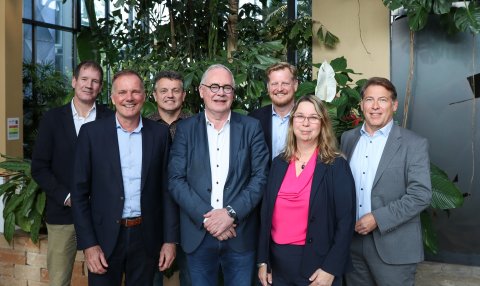
Artificial intelligence (AI) may be the latest technology trend generating mass excitement, but there remains little in the way of concrete use cases. Or at least, that’s how it seems…
The launch of ChatGPT late last year has made AI a common topic of dinner party conversation, but something that may be less well known is that AI is already employed in businesses around the world. ChatGPT has certainly accelerated AI discussion, but industries ranging from healthcare to financial services have been utilising AI in some form for some time.
Integrated Facilities Management (IFM) is another sector that is no stranger to the benefits that AI can unlock. AI algorithms have been employed in IFM businesses for a number of years - assisting with security, sustainability, maintenance and more. For example, Google reduced its data centre cooling costs by 40% when it deployed its DeepMind AI solution. Similarly, Southwest Airlines has lowered maintenance costs by 20% by leveraging AI to deliver predictive and prescriptive maintenance. Unsurprisingly, 81% of IFM executives surveyed by Deloitte said that AI and automation would play a significant role in the future of IFM.
AI and IFM - the perfect partnership
Emphasising the fact that AI and IFM have been operating in tandem for several years already is the concept of hyperautomation. At Planon, we see hyperautomation as the convergence of all the intelligent technologies associated with end-to-end connected automation: (connected) algorithms, advanced analytics, process mining, the Internet of Things, PropTech and, of course, AI.
One such area where IFM services can benefit from hyperautomation and AI is energy management. For instance, Building Advisor, a native integration between Schneider Electric’s EcoStruxure Building Advisor and the Planon Facility Services Business Solution (FSBS) platform (a EAM/CAIFM/CMMS/IWMS), uses AI algorithms to analyse and monitor asset conditions to identify possible inefficiencies.
Another Schneider Electric solution, Power Advisor, identifies inefficiencies in a building’s lighting system that lead to increased energy usage or harmonic distortion1 that falls outside pre-configured parameters (or typical AI ‘learned’ asset-specific conditions). Connected algorithms will then kick in so that a work order is automatically created (within the boundaries of the agreed services and financial constraints) and sent to the relevant engineer before the asset consumes too much energy or suddenly fails.
AI reduces the manual workload on IFM services teams, which can rapidly increase because of numerous energy management events or other critical IFM activities, allowing end users to enjoy a better workplace experience and focus on adding value.
Stakeholder-centric AI
Although much of the talk around AI, understandably, focuses on its technological implications, the human aspect of any AI-related project should never be neglected. Technology is not a goal in itself; it is a tool for adding value.
When businesses are looking to add value by applying AI to IFM, it’s essential that all stakeholders are considered. And the only way to do this is to examine the proposed use cases from four relevant business perspectives and understand how they are interconnected in order to deliver a Total Experience.
In terms of customer value, AI and user-centric business solutions can combine to drive growth for asset analytics and optimisation, energy management, space utilisation, health and wellness, waste management and more. Multi-sensory and multi-touchpoint interfaces can send relevant data to AI solutions that then apply automation to ensure a holistic experience.
Let’s look at a comfort-related example of an AI use case for IFM services. The Building Advisor AI can automatically learn the root cause patterns of a building’s HVAC airflow under certain conditions, such as fluctuations in negative or positive air pressure levels in certain building compartments caused by opening and closing of doors, windows, or HVAC system gates. If you’ve been wondering whether a poltergeist has invaded your business, relax. There’s no need to call in the ghostbusters; the problem is just your HVAC system. At the root of these unsettling issues is an HVAC air pressure imbalance, or external building cause which can either be a faulty or inefficient HVAC system or just an external fluctuation incident.
What’s the link between fluctuating negative pressure & HVAC? Both your air conditioner and your furnace have to work harder to counteract the outside air being drawn into the space because of negative air pressure, using more energy in the process. An occurrence that is easily identified by the Building Advisor AI, distributed via hyperautomation to the IFM services team and acted upon to avoid steeper energy bills
This behaviour, taking place at the perimeter of buildings or rooms, can be learned by AI to prevent unqualified triggered events, while minimising associated costs. The ‘trained’ AI system will consistently monitor HVAC performance to maintain a positive experience for building end users while minimising energy consumption.
In addition, costs for events can be reduced by optimising energy management and using prescriptive maintenance regimes - both without compromising on end user comfort. Other efficiencies can also be identified to create further cost savings. And with regard to a company’s internal processes, AI can trigger streamlined hyperautomated workflows that help to integrate context-related business processes and ensure they are aligned with broader company goals.
A value-driver. Not a threat
For all the excitement being generated by AI, there are also fears. Aside from hyperbolic predictions about an AI apocalypse, there are more mundane concerns that AI will result in large job losses. While not completely unfounded, technology has always created more jobs than it has destroyed.
One vision for the future of AI-enabled IFM involves IoT cleaning robots. While this may result in the employment of fewer cleaners, it is likely to mean a greater need for engineers to maintain the robots or developers to monitor the software that controls them. For IFM providers, it simply brings more capacity with the same available resources, which is a huge benefit considering demographic trends and rapidly ageing populations. As such, AI should not be feared by IFM providers but embraced as a way of adding value - by providing better services in a cost-efficient way which increases overall capacity.
AI can play a crucial role in future business-related diversification in the IFM industry. In fact, the way hyperautomation has been embraced by some organisations demonstrates that it is already playing a big part. ChatGPT has undoubtedly accelerated the discussion, but vendors like Planon have long explored the ways that AI and hyperautomation can enhance smart building assets. The time is right for AI to move from a dinner party conversation to a boardroom discussion - one that covers the concrete benefits that AI can unlock for building end user experiences, energy management, maintenance management, and more.
If this blog has triggered your interest and you wish to learn how Planon can support your future strategy of business-related diversification, feel free to contact us for a conversation on where AI can add value to your business.
Would you also like to to assess your current maturity level for operational excellence in today's world of smart sustainable buildings? Take this 6-question assessment to get an understanding of your digital readiness for delivering smart IFM services.
[1] Harmonic distortion is the change in the waveform of the supply voltage from the ideal sinusoidal waveform. It is caused by the interaction of distorting loads from asset(s) with the supply network. https://www.sciencedirect.com/topics/engineering/harmonic-distortion





















